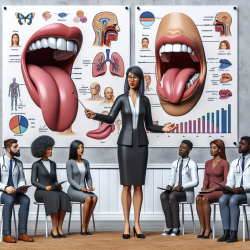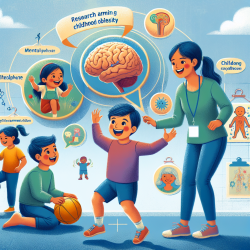Introduction
In the field of speech-language pathology and therapy, understanding the nuances of social stigmatization is crucial, especially when working with children who face unique challenges. The research article "Social Stigmatisation in Late Identified Patients with Disorders of Sex Development in Indonesia" sheds light on how social stigmatization affects individuals with disorders of sex development (DSD) and offers valuable insights for practitioners aiming to improve their skills and patient outcomes.
Understanding the Research
The study conducted in Indonesia highlights the significant impact of social stigmatization on individuals with DSD, particularly those with visible physical atypicalities or those who have undergone gender changes. The research utilized the Social Stigmatisation Scale for DSD (SSS-DSD) to assess the frequency and stress levels associated with stigmatizing experiences. Key findings include:
- Patients with visible atypicalities and those who changed gender faced higher levels of stigmatization.
- Stigmatization was associated with ostracism, depressive symptoms, and social isolation.
- Education about DSD and self-empowerment can mitigate these negative experiences.
Implications for Practitioners
As practitioners, understanding the social dynamics and stigma associated with DSD is essential for providing comprehensive care. Here are some ways to implement the findings from this research into practice:
- Education and Awareness: Educate yourself and your colleagues about DSD to reduce misconceptions and biases. This knowledge can then be shared with patients and their families to empower them and reduce feelings of isolation.
- Supportive Environment: Create a supportive and non-judgmental environment for patients and their families. Encourage open discussions about their experiences and feelings related to stigmatization.
- Advocacy: Advocate for policies and practices that promote inclusion and acceptance of individuals with DSD. This can include working with schools to ensure they provide a supportive environment for affected children.
Encouraging Further Research
The study underscores the need for more research on DSD and social stigmatization, particularly in non-Western contexts. Practitioners are encouraged to engage in or support research initiatives that explore these issues further. By doing so, we can contribute to a more inclusive understanding of DSD and improve the psychosocial outcomes for affected individuals.
Conclusion
Understanding and addressing social stigmatization in patients with DSD is vital for improving their quality of life and psychosocial well-being. By incorporating the insights from this research into practice, practitioners can play a pivotal role in reducing stigma and fostering a more inclusive environment for all individuals.
To read the original research paper, please follow this link: Social stigmatisation in late identified patients with disorders of sex development in Indonesia.










